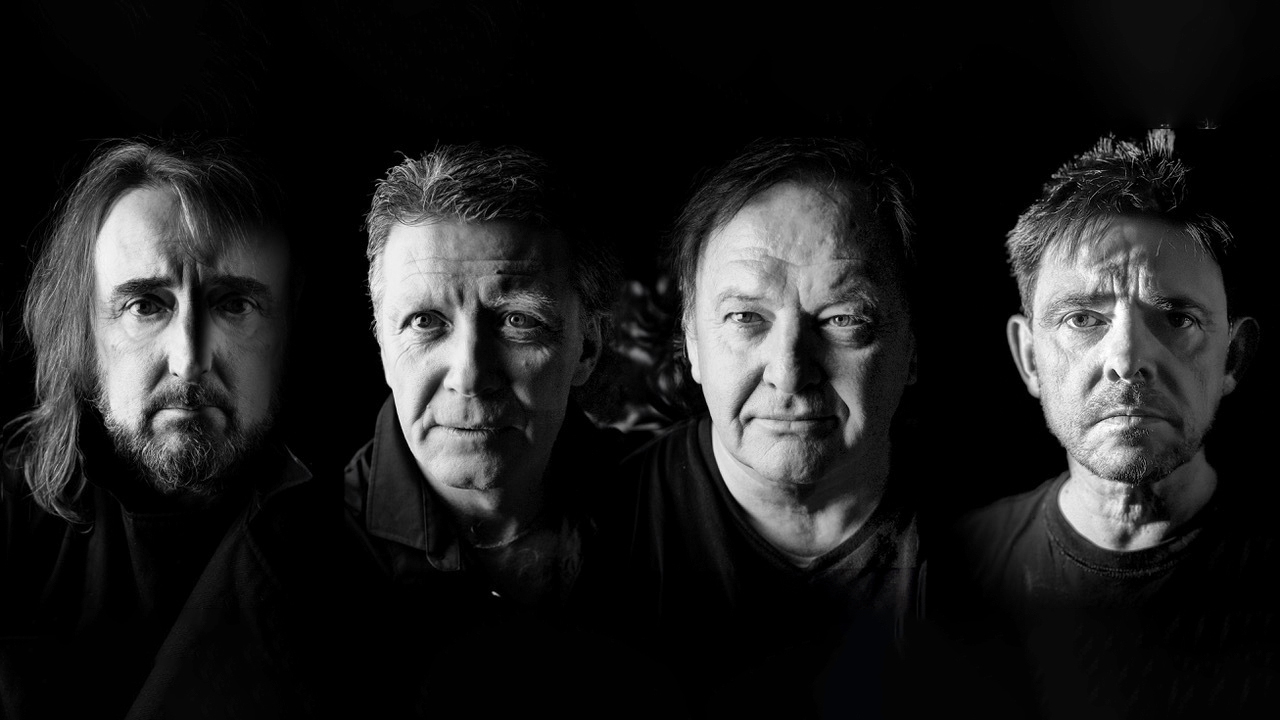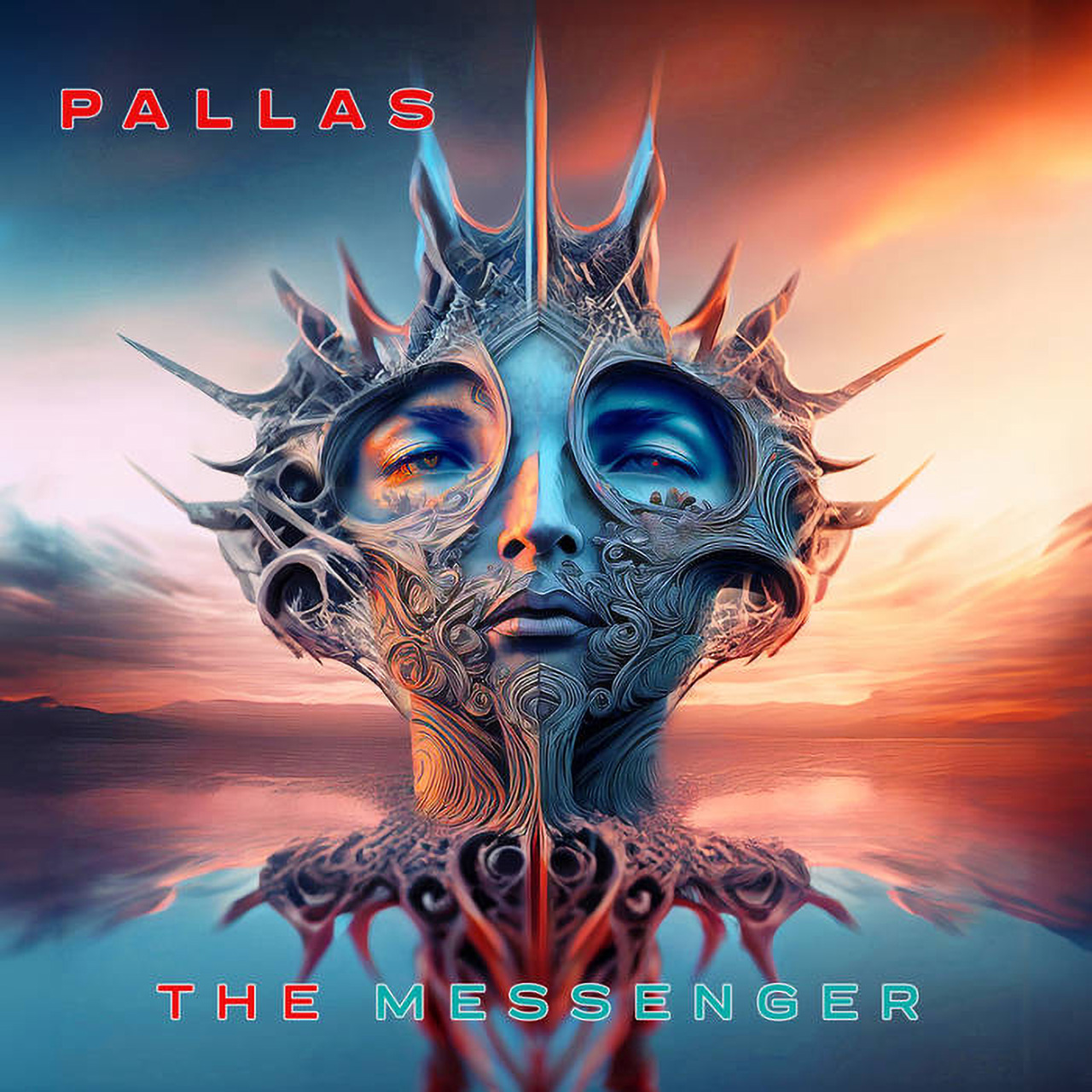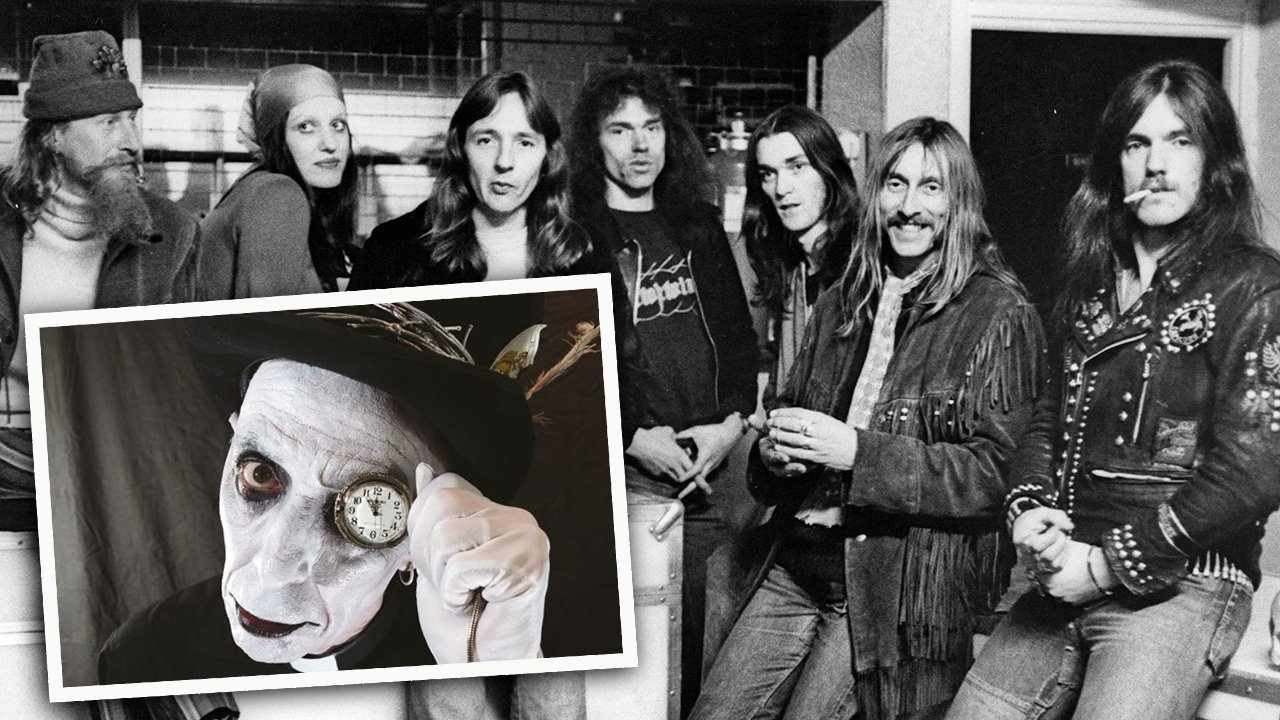
Its mood consistently dark and ominous, Pallas’s latest album, The Messenger, contains songs about climate change, disinformation and the reigniting of the Cold War. It’s only the band’s eighth album in 58 years – but they’re certain it was worth the wait and turmoil.
There’s sluggish, there’s long-winded, there’s slow, there’s languid and unhurried. Then there’s the speed at which Pallas seem to operate, which can best be described as glacial. Prog’s correspondent has just taken his life into his hands by voicing this theory to the veteran Scottish neo-proggers. Fortunately, they erupt with laughter before addressing the truth behind our statement.
“We take a long time to do anything,” says a smiling Ronnie Brown, “and then quite often we’ll go back and do them all over again. I don’t think we will ever do anything quickly. We’ve turned messing around and going down alleys into an art form.”
“No, we’re not the fastest-moving group of individuals,” Alan Reed says, nodding in agreement. “But having said that, cutting the tracks was done quite quickly. Once I rejoined, that kick-started things a little.”
“By our standards this album has been quite quick,” Graeme Murray continues. “Five years. For us that’s lightning speed.”
“The bottom line is that with Pallas, things take as long as they take,” says Brown. “If we’d set ourselves a deadline of making it in five years, it could have been another five years.”
Apologies for labouring the point, but it’s worth making: Pallas are reminded that the studio album we have met over Zoom to discuss, The Messenger, is just their eighth in their 48-year history. The statement causes Murray to grasp his head in his hands theatrically, before retorting: “Aye, but let’s be positive – at least we’re all still here. And I can assure people that the album is well worth the wait.”
Sign up below to get the latest from Prog, plus exclusive special offers, direct to your inbox!
Murray and keyboard-player Brown are in Aberdeen. Vocalist Reed has also returned to his native Scotland after a lengthy period down south. Although the singer has been back in the line-up for just under two years, given the unseemly manner of his second exit from Pallas in 2010, which was accompanied by strong words from both sides of the divide, seeing them all together again feels slightly odd.
“I was bounced into doing this album...” Reed begins.
“We locked him in a cupboard – literally!” interjects Murray, grinning.
In fact it was Mike Stobbie, a keyboard player with two different spells in Pallas, who played matchmaker. “I’d washed my hands of the band long ago,” Reed says. “I went out for a drink with Mike, who filled me in on what was going on up there: they were working on an album. But of course I’d heard that tale many times before.”
“We’re always working on an album,” Murray adds.
“Several pints into our drinks, Mike asked me: ‘Why don’t you rejoin Pallas?’” Reed recalls. “To which I replied: ‘No, no, no.’ There was a whole series of reasons why I wouldn’t do that. It was when Mike said, ‘What if the other guys had all changed?’ that the idea became easier to consider. The next thing I knew, Mike had Graeme on his phone. Basically, I’d been set up.
“I woke up the following morning and wondered, ‘Did I just rejoin Pallas?’” the singer says, smiling. “A few days later I was due to be in Scotland anyway, so I came up and we had a summit. And I found it was easier to get on with them.
“I heard the demos of the material, which was very dark and also extremely strong, typically Pallas. It was clear there was a great album there. So we got Niall [Mathewson, guitarist], who now lives in Cambodia, via FaceTime and went over the issues that needed to be addressed. We found that despite everything that happened in the past we could get on again.”
Which brings us to the question of what happened to Paul Mackie, the singer who put in a good shift with Pallas on their previous two albums, XXV and Wearewhoweare in 2011 and 2014? Did he leave?
The way we worked this time was much, much more of a group effort… in many ways that has caused us all to get on a lot better
Alan Reed
“Nobody leaves this band,” Brown deadpans. “Pallas is a family. No, I’m being serious. We could call upon Paul at any time. Right now Paul is not actively contributing, but there’s no acrimony. Euan [Lowson, the band’s original singer] is still involved behind the scenes. Mike Stobbie clearly is.”
Although ‘issues’ blew up when Reed last departed Pallas – a few uncomfortable things were said about geography, with the singer being based down south causing them to doubt his commitment – there was no awkwardness around his return.
“Once we’d decided that we were going to make an album, working together brought a real buzz of excitement,” Murray insists. “In fact we’ve just been watching some rushes of a video made by Mike Bentley [the man behind the scenes who makes Pallas tick] and we’re all blown away. The visuals that accompany the music are truly incredible.”
This latest burst of activity from Pallas can be traced back to a 2018 Facebook post from Murray in which the bassist cryptically stated that the band were “not dead but in a state of suspended animation,” and closed with the prediction: “The patient may [yet] come back to life.”
“That’s right,” he confirms. “It was high time we got off our arses and did something.” Mathewson living overseas was among the numerous hurdles that needed to be overcome. “Making the album remotely was quite a challenge, no doubt about it,” says Murray. “In theory it’s easy, but in practice it’s far better to have everybody in the room playing and making judgements. Ronnie has done a huge amount of work on this album.”
“I’ll agree with that,” says Reed. “I hadn’t worked with Ronnie directly before as much as I did this time. Normally I do my vocals and they add stuff around it, but the way we worked this time was much, much more of a group effort than on previous albums. In many ways that has caused us all to get on a lot better.”
Fever Pitch ends with people overlooked by a red sky and being pushed into the sea because they’ve nowhere else to go, as we watch the fires raging
Ronnie Brown
There’s no doubt that Pallas’s teamwork has served to create an album rich in detail and full of intricacy – although, as Reed stated earlier, its mood is consistently dark and ominous. With songs about climate change, disinformation and the resurrection of the Cold War, lamenting (as the record’s biography states) “the seeming inability of our leaders to do anything but pour fuel on the flames,” The Messenger is about as far from easy listening as it’s possible to get.
“The songs address various different subjects, including a lot of stuff that’s current just now,” Brown says in agreement. “The Ukraine war inspired it a lot, though it’s not specifically about that. It’s really about the fact that we are being fed lies.”
“One song, The Great Attractor, has a cameo from Donald Trump,” Murray adds, his facial expression betraying his contempt for the former US President. That’ll be the song with lyrics: ‘The hate attractor, the great distractor/ Now he’s gone, please don’t ever come back’?
“It could just as easily be about Boris Johnson,” Reed says.

There’s no mistaking the subject matter of Fever Pitch, which warns of ‘hiding from the sun that burns’ and ‘promised rain that never comes,’ an ode to our planet ‘crying out in pain.’
“It’s not a futuristic thing,” says Reed. “As we were recording the album, global warming became worse. That’s a serious problem that’s on top of us all right now, as we speak.”
“We’ve had weeks of flooding up here in the north of Scotland,” says Murray. “Rain, rain, day and night. It’s not natural.”
Brown adds: “Fever Pitch ends with people overlooked by a red sky and being pushed into the sea because they’ve nowhere else to go, as we watch the fires raging.”
The Nine goes a stage further still, with the human race ‘suffering its final fall from grace.’ Reed reveals proudly: “That one is probably my favourite on the album, because it’s full of unpleasant images that form in your head and just won’t go away. It was influenced by Ukraine.”
“Though it’s not specific to Ukraine,” Brown insists. “It’s just that the war was going on during the writing.”
Although a common mood of deep sombreness unites the songs, The Messenger isn’t a concept album. “No. Every track is about something different; there isn’t a real consistent thread between them,” Brown says. “For instance, The Messenger is an environmental song.”
At 13 minutes long and bringing the album to a close, The Messenger is, in fact, the album’s epic swansong. “You’ve got to have one of those,” a beaming Murray says. “You’ve just got to do it.”
“They’re all quite long songs, actually,” Reed notes. “There’s only six on the album.”
On the lighter side of things, there are interludes of brightness. For example, nine-minute opener Sign Of The Times welds some pleasing Jon Anderson-style choral moments to lyrics about another malaise in this society of ours, namely that everybody craves things they can’t possibly have.
“Guilty as charged,” Brown says, owning up to the Yes influence. “And you’ve nailed what the song is about.”
“I’ve never really sung like that before,” Reed admits cheerfully, “but I’m very pleased with the way the song came out.”
Having flitted around various record companies, including EMI’s Harvest imprint for 1984’s The Sentinel and ’86’s The Wedge, to InsideOutMusic and Mascot, Pallas are self- releasing The Messenger. “There would be no point in involving a label because, with the best will in the world, the money isn’t really there,” Reed points out. “It’s better that we take a larger slice of a cake that’s all our own than a smaller slice of another.”
I really don’t like the thought of sitting here and saying there will be no more live dates from Pallas
Ronnie Brown
Although the unlikely return of Reed has undoubtedly helped them make an excellent album, Mathewson’s continued presence in Cambodia means that Pallas are now essentially a studio-only band.
“We’ve discussed the possibility of playing live again, but obviously the finance side makes things difficult,” Reed sighs. “Also, Graeme would need to become match-fit again after some medical issues.”
“Playing live again probably isn’t out of the question, though it’s not something that I particularly want to do,” Ronnie Brown admits. “I don’t see any reason why they couldn’t bring in somebody to cover for me, but it’s a discussion we’d have to have. All the same, I really don’t like the thought of sitting here and saying there will be no more live dates from Pallas.”
“The best reply to that question,” Reed says, smiling helpfully, “is to go with: ‘Never say never.’”

Dave Ling was a co-founder of Classic Rock magazine. His words have appeared in a variety of music publications, including RAW, Kerrang!, Metal Hammer, Prog, Rock Candy, Fireworks and Sounds. Dave’s life was shaped in 1974 through the purchase of a copy of Sweet’s album ‘Sweet Fanny Adams’, along with early gig experiences from Status Quo, Rush, Iron Maiden, AC/DC, Yes and Queen. As a lifelong season ticket holder of Crystal Palace FC, he is completely incapable of uttering the word ‘Br***ton’.
